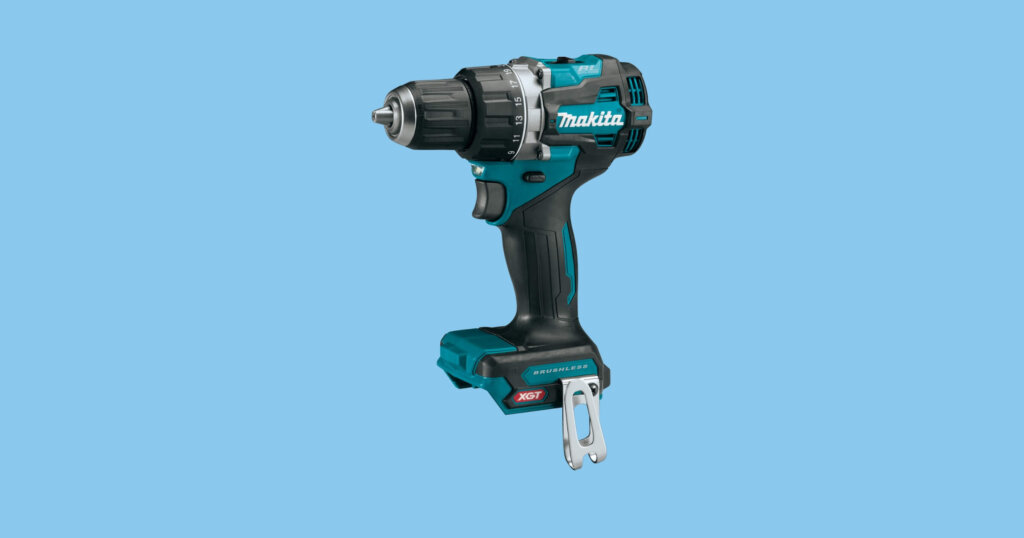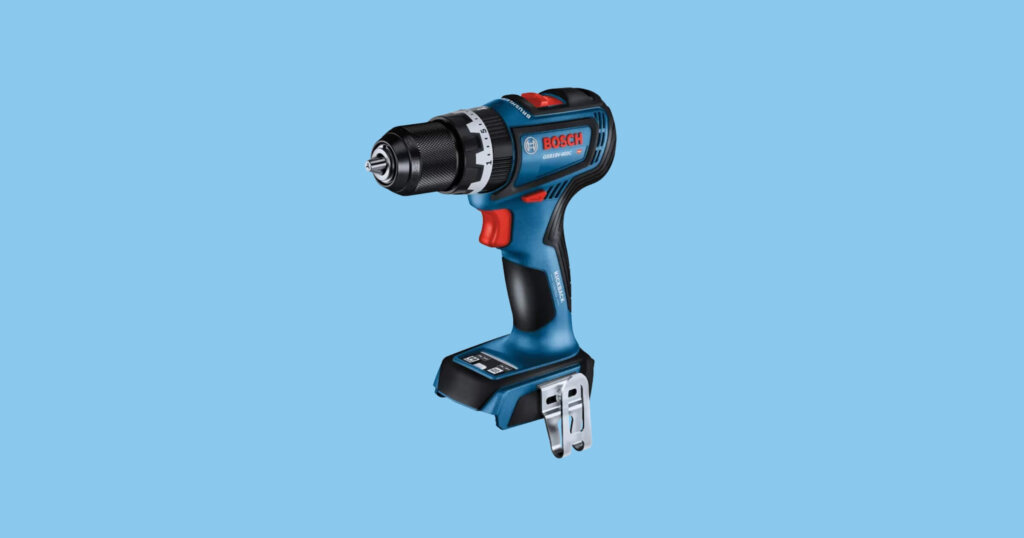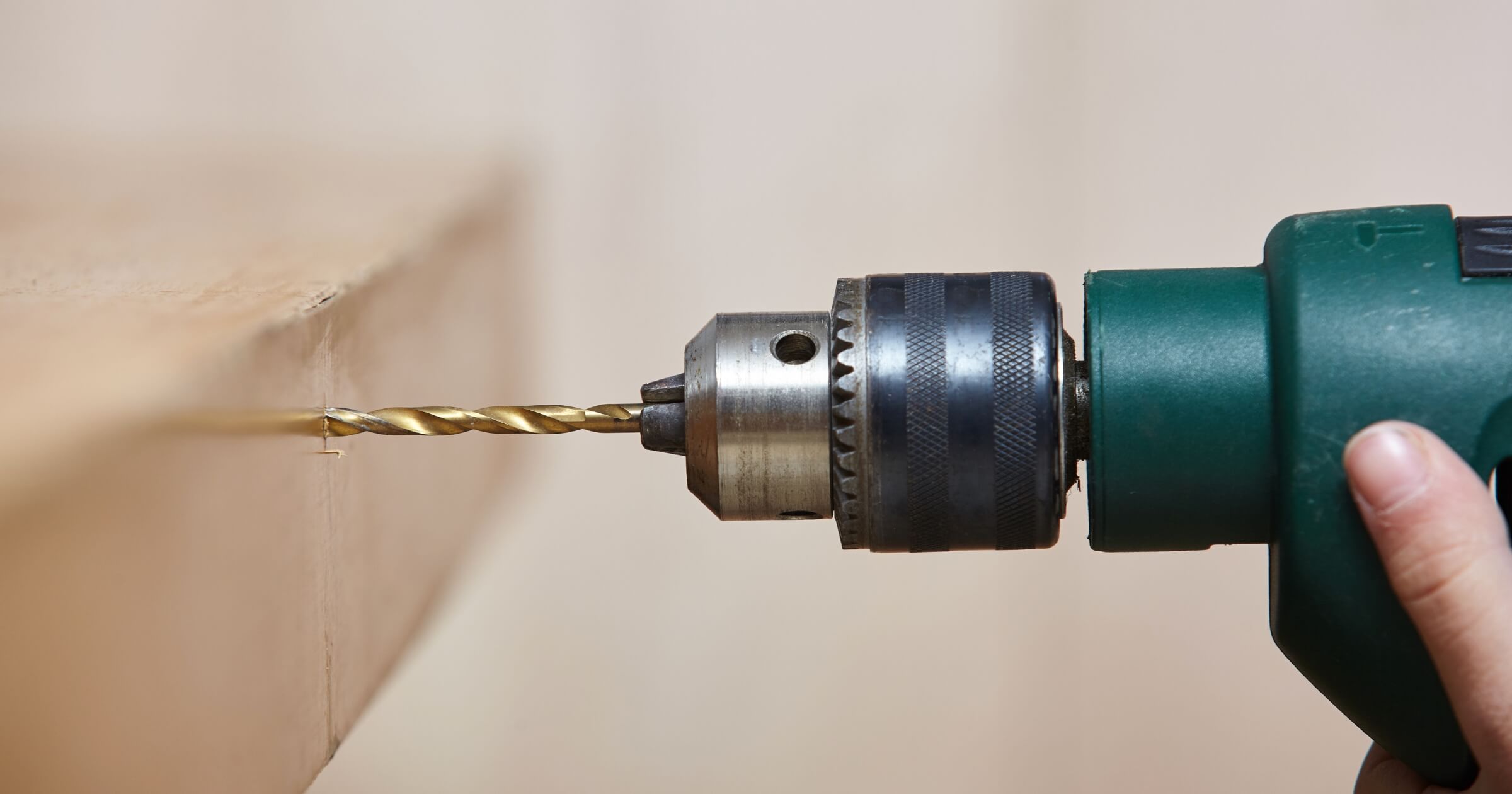Compact drills are great for quick jobs around the house or on-site. Makita and Bosch both offer great models, with many users comparing the Makita 40V Max XGT® ½” Driver Drill to the Bosch 18V-800CN ½” Professional Hammer Drill/Driver. Makita has the performance and power and Bosch has unmatched durability and versatility. But who makes the better compact drill? In this article, we compare Makita vs. Bosch compact drills head to head so you know which one to choose for your work.
Makita 40V Max vs Bosch 18V-800CN: Quick overview
Makita 40V Max compact drill in a nutshell

The Makita 40V Max GFD02Z perfectly balances compact size and maximum power. This drill has a brushless motor and delivers 585 in-lbs of maximum torque. It has two speed settings, maxing out at 2,200 RPM and a 40V lithium-ion battery for longer performance. Makita has a long-standing reputation for power and performance.
Bosch 18V-800CN compact drill in a nutshell

The Bosch GSB18V-800CN is the perfect compact drill if control and ease-of-use is your top priority. Offering 565 in-lbs of max torque, this drill packs a punch and delivers speed up to 2,100 RPM, both slightly lower when comparing it to the Makita 40V Max. The Bosch GSB18V-800CN does come with 20 clutch settings to fit any application, and an all-metal chuck for durability that lasts. Users come to Bosch for their durability and innovative features.
Makita vs. Bosch: How do the Makita 40V and the Bosch 18V-800CN compare on paper?
Let’s break down the specs, so you can get the facts straight and shop smarter.
| Feature | Makita 40V Max | Bosch 18V-800CN |
| Battery output | 40V | 18V |
| Battery included? | No | No |
| Max speed | 2,200 RPM | 2,100 RPM |
| Variable speed | Yes | Yes |
| Max torque | 585 in-lbs | 565 in-lbs |
| Height | 7.72” | 8.3” |
| Maximum bit diameter | 2” | 2-5/8″ |
| Reverse | Yes | Yes |
| Weight | 4.2 lbs | 2.7 lbs |
Performance and power: Which compact drill packs more punch?
Great performance and power are, of course, on top of everyone’s must-have list. And on paper, the Makita takes the cake. It has a longer battery life and delivers a bit more speed and torque. That being said, Bosch isn’t very far behind in the performance and power department. It tops out at 20 in-lbs less torque, and only 100 RPM slower.
“Performance” in a real-world application is all about strong, consistent operation while working. If your drill kicks on with a lot of power but quickly loses momentum at top speeds, it’s lacking in the performance department. Performance means a quality of operation that remains consistent through any job.
In this case, both drills are pretty closely matched, but with Makita’s higher capacity, longer-lasting battery, we have to give it the win.
Ease of use & ergonomics: Which compact drill is more beginner-friendly?
If you get fatigued easily or are new to DIY and construction projects, ergonomics and ease of use will also be important. Here’s how both the Makita and the Bosch drills measure up:
- Handling and balance: While both drills are compact, the Bosch is lighter and taller, making handling and balancing a little smoother.
- Grip and controls: The ultra-smooth variable speed trigger is a little more user-friendly on the Makita.
- Vibration and noise: Both drills are low-vibration and quiet, but the Makita’s XGT technology prevents overloading and over discharging, keeping noise and output under control.
- One-handed or overhead use: The Bosch is noticeably lighter, so it wins in the one-handed and overhead category.
Because most use cases for a compact drill are smaller and quicker than for professional use, we give this one to Bosch. It’s light and compact, and the handling is better for beginners overall.
Price and value: Which compact drill is more bang for your buck?
You can find the Bosch compact drill on Amazon for $159, and the Makita compact drill is on the Home Depot website for $189. Pricing may vary between retailers, and both are great for your budget, but generally, we find that the Makita drill is slightly more expensive wherever you shop.
If you go with Bosch, you can expect a 5-year limited warranty, and with Makita, you get a 3-year limited warranty. And if you already have tools, batteries, and chargers from one of the brands, it might be worth it to go with the compact drill to match for the convenience and money saved on battery systems.
If you’re looking to get a bang for your buck, the Bosch compact drill is the clear winner.
To summarize
Makita: Excels in brushless technology, raw power, and a wide range of tools. It’s a little more pricey, but its powerful performance makes it worth it. They’re easier to find in stores, and Makita has a bigger community attached to the brand.
Bosch: These tools have a strong battery ecosystem, and Bosch is known for being innovative in the tooling space, like their “auto-lock” functionality which makes tool changes easy. They have a great price and a longer warranty than Makita.
Makita vs. Bosch: Which compact drill should you buy?
When it comes down to it, it’s all about preference. Both the Makita and the Bosch drills are great, and you’ll end up with quality you can count on.
But if you’re looking for tools with maximum power, a brand with more tools, a bigger community, and top speeds, go with Makita.
If you’re looking for a brand that innovates, is easier for beginners, and is a little cheaper with a longer warranty, choose Bosch.
Both tools are great for the same applications, so whatever your next project is, it’s sure to come out a success.
For more breakdowns between tool brands, follow us on LinkedIn and subscribe to the newsletter!



2 comments